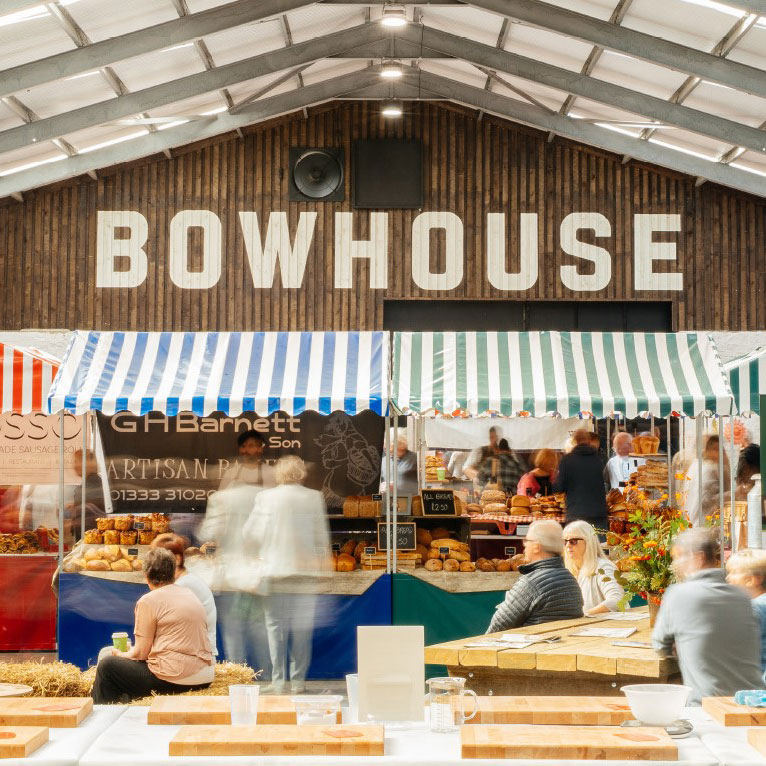
Image courtesy of www.bowhouselife.com
Many food hubs gained new customers when shoppers changed their habits through Covid-19 and lockdown. But the cost-of-living crisis threatens to undo this success – as Rosie Jack, manager of Bowhouse, in Central Scotland, explains.
Bowhouse is a market space in Fife, Central Scotland, which works with local traders to promote and sell local food to their community. Having held its first market in July 2017, it now serves 4500 customers monthly and permanently houses eight small retailers, from a flour mill and bakery to a zero-waste refill store and butchery. The food hub is based within the Balcaskie estate, a farm currently transitioning to become organic, low-input, and more sustainable.
As everywhere, the effect of Covid-19 was felt at Bowhouse: the business was not able to put on its popular, free-to-enter market weekends and lost retailers who previously attended. Like others, Bowhouse responded by setting up an online shop. After lockdown, footfall at the monthly markets dropped, and has since plateaued. It might seem counterintuitive, but Rosie sees this as a step forward. While their pre-Covid market weekends attracted a large footfall, many of the visitors were ‘window shoppers’, who didn’t spend much money in the market hall. Setting up the online shop gave Bowhouse a more consistent presence in the community, attracting a smaller but more loyal customer base. Rosie had long wanted customers to see beyond their popular events: “The online shop had an important effect,” she says, “encouraging customers to see Bowhouse as a place to do their routine shopping, rather than just as a fun day out.”
Squeezed by the cost-of-living crisis
However, the rocketing costs of living over the past few weeks have caused Rosie to worry that Bowhouse’s customers may drift back to their old, window-shopping ways. At the June market weekend, people arrived with a specific budget in mind. Sales were down.
And it isn’t just customers who are feeling the pinch. Rosie noted that margins seem to be getting tighter for traders renting a space at the market, and Bowhouse’s own costs have increased. By their nature, food hubs are ‘stuck in the middle’ between consumers and producers. Many hubs will recognize how the cost-of-living crisis has put pressure on them as small, coordinating intermediaries of supply chains. In fact, as a market space, Bowhouse is continuously balancing the needs of three types of customer: people who buy produce, traders at the market and the tenants whose businesses are permanently based on-site. It seems likely that Bowhouse will have to shoulder a financial burden if the market as a whole is to weather this crisis. The challenge will be to remain attractive to customers, and thus be able to keep the traders there.
Rosie is concerned that new food hubs will find things especially difficult. She was keen to stress that Bowhouse had not achieved success without support from bigger organisations, such as the sector trade association Scotland Food and Drink, the Soil Association and the Balcaskie Estate. For food hubs looking to establish themselves, she identified support from the local council, national government and local businesses to be crucial. She described Bowhouse as “a habitat for small businesses”, somewhere they can produce from, trade from – and meet each other. “If you can get the backing of a business support group in your local area, and you can demonstrate that your business is going to benefit other small businesses, then that is a great way for them to help you.”
A familiar food hub dilemma: compromise values for financial viability?
Rosie also emphasizes Bowhouse’s transparency as a route to success. “We hide pretty much zero information, so if traders want to understand what our books look like, we share percentages.” This candour also helps Bowhouse attract traders who share their ethos and values. As many hubs will recognise, it can be difficult pursuing a strong code of values when establishing a viable food business. A key problem for Bowhouse has been that its efforts in prioritising local and sustainable food have not always been well understood: “I think we’ve learned over time how to explain to businesses what we’re trying to achieve,” she explains. “But in our area of Scotland there’s maybe farmers who just think, ‘You’re absolutely bonkers. Why are you doing this in this way? You’re making your life more difficult and potentially less profitable’.” Diplomatically, Rosie acknowledges that everyone has different values and plans. While for some, it might seem crazy to persevere with their vision of an alternative food system, Rosie is determined that Bowhouse will find a balance to meet the needs of traders, tenants and customers who want to supply and buy local, sustainable food in Central Scotland.
Find our other work on Sustainable Food Hubs at https://foodresearch.org.uk/supporting-sustainable-food-hubs/

